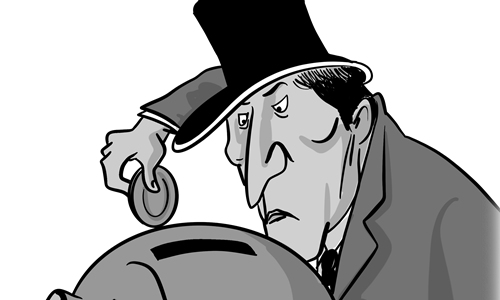HOME >> SOURCE
Rubio errs again in slamming China-US trade deal
By Xiao Xin Source:Global Times Published: 2020/1/21 23:06:26

Illustration: Luo Xuan/GT
Marco Rubio, the US senator behind the anti-China legislation on Xinjiang and Hong Kong, has lately taken another wrong step with his op-ed piece in The New York Times on Friday where he criticized, on unreasonable grounds, the financial services section of the phase one trade deal signed between China and the US.The senator's doubling down on his anti-China rhetoric should be a wake-up call for the US to guard against self-deceiving protectionism that will do the American people no favors and instead subject them to a downward spiral in both moral and economic terms.
The long-awaited agreement has been widely seen as a boon for both economies and the global economy at large. But in the words of Rubio, the agreement fails to hold China accountable for exploiting US capital markets and "will make sure American capital continues to directly fund China's state-run economy."
The Florida Republican wrote that investing in China is not a good deal as the resulting short-term gains "will come at a tremendous cost in the long term."
There's no logic to his claims. It's utterly absurd to assume that the US capital markets, the most sophisticated globally, would be blindly financing other nations' economic and industrial ambitions. The main reason behind US capital investing in China is the allure of the Chinese market. There is no reason to describe US businesses that have over the years reaped large gains from investment in the Chinese market as brainless accomplices that have funded a regime undermining the US economy.
The twisting of China's contribution to the US capital markets - many Chinese companies have floated on the US market - into evidence of China's "exploitation" of the US markets lays bare the senator's lack of professionalism. More worryingly, it reveals an unhealthy mindset haunting Wall Street that there always needs to be vigilance against China.
This attitude stands in stark contrast with China's efforts to open its financial markets wider to foreign investors. As China's central bank has put it, the financial markets section of the phase one deal, which features reciprocal obligations on both sides in financial services opening, reflects and details financial deregulation measures having been taken by China.
The pledge for greater openness is expected to gradually sharpen China's competiveness in the financial sphere. Ideally, the US ought to meet China halfway in pushing for a more open financial arena across the world. If the US moves against the opening drive, its longstanding position in the global market as the undisputed financial power would be gradually undermined. The US, rather than China, would be to blame for its own decline were Rubio to be seen as an oracle on China-US relations.
The author is a reporter with the Global Times. bizopinion@globaltimes.com.cn
Posted in: INSIGHT,COLUMNISTS